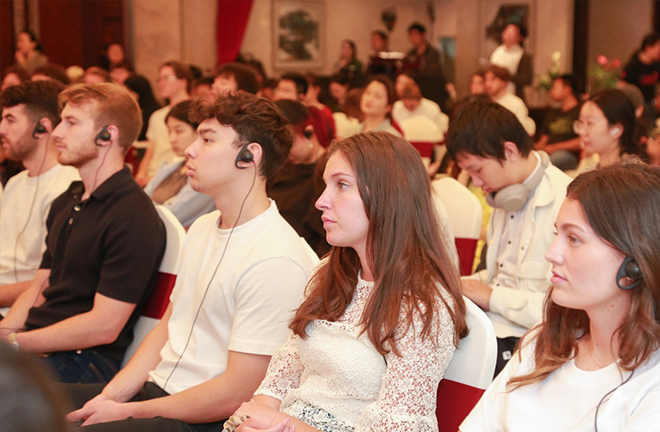China and France continue friendly cultural exchanges

A dialogue between Chinese and French youth on cultural exchanges Photo: RUC (SUZHOU CAMPUS)
The year 2024 marks both the 60th anniversary of the establishment of diplomatic ties between China and France and the China-France Year of Culture and Tourism. Over the six decades, the two countries have cultivated a deep friendship and achieved fruitful cooperation in a variety of fields. As prominent representatives of ancient Eastern and Western civilizations, Chinese and French cultures generate remarkable dynamism in their interactions, leaving a significant impact on the global stage.
On May 22, a series of youth dialogues on the theme of “the 60th Anniversary of the Establishment of Diplomatic Relations between China and France: Mutual Learning Between Civilizations Among Youth” were held in Suzhou, Jiangsu Province. Young representatives from China and France were invited to share their experiences on topics including “Suzhou Museum and the Louvre,” “Sinology and Western Learning,” and “Youth and the World.”
Continued cultural interactions
“Since 2021, Suzhou Museum has signed cooperative agreements with the British Museum, planning to organize four series of exhibitions on the history of world civilizations over five years,” said Li Zhe, deputy secretary of the general Party branch and deputy curator of Suzhou Museum. This year, Suzhou Museum will further deepen its cooperation with major museums in France, hoping to present the Jiangnan [regions south of the lower reaches of the Yangtze River] cultural exhibitions to France and allow more French citizens to understand traditional Chinese culture.
Today, a large number of French citizens call China their home. French art collector Claire came to Suzhou in 2011, where she established the “Exagon,” an antique furniture and decoration shop. At the forum, she expressed her love for Ligongdi Street in the Suzhou Industrial Park with the phrase “staying true to the original aspiration.” Filled with passion for the city, she has gradually integrated into local life, becoming a genuine “new Suzhounese.”
Time-honored history
The translated works of French writer Jean Giono have been available in China for 90 years, explained Lu Xun, deputy dean of the School of Foreign Languages at Soochow University. In 1934, Dai Wangshu translated and published a collection of modern French short stories, the first of which was a work by Jean Giono. Giono’s complete works were brought in in the 1980s with the reform and opening up. Today, his work Trilogy of Pan is available in nearly 10 different translations.
The translation of ancient Chinese vernacular fiction in France has a long history. Lyu Ruyu, a lecturer from the French Department of the School of Foreign Languages at Renmin University of China (RUC), said that the French translation of ancient Chinese vernacular fiction began as early as 1435. From Description géographique, historique, chronologique, politique, et physique de l'empire de la Chine et de la Tartarie chinoise to the efforts made by contemporary French sinologists, the translation of ancient Chinese vernacular fiction has always been intertwined with the development of French sinology. Over nearly 300 years of dissemination, texts from ancient China have been reinterpreted and represented by translators and scholars, showcasing the strong vitality and infinite charm of Chinese literature to French readers and affirming the value of literary translation for cultural exchanges.
The spread of Chinese linguistics in France dates back to the 19th century. Wang Zhichao, a lecturer from the French Department of the School of Foreign Languages at RUC, said that with the establishment of diplomatic relations between China and France, French scholars began to cultivate a strong interest in Chinese. Early sinologists such as Stanislas Julien (1797–1873), through the translation and annotation of ancient Chinese classics, laid the foundation for the study of Chinese in France. At the dawn of the 20th century, Chinese linguistics gradually separated from literature and historical studies and grew into an independent academic discipline. During this period, sinology research institutions and universities in France successively set up Chinese-related courses, witnessing the cultivation of a great many representative sinologists.
The event was hosted by RUC and co-organized by the Foreign Affairs Office of Suzhou Municipal People’s Government, the Suzhou Youth Federation, and the Suzhou Campus of RUC.
Edited by YANG LANLAN

 PRINT
PRINT CLOSE
CLOSE